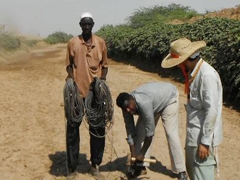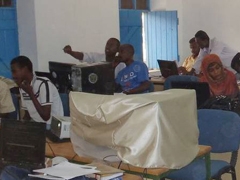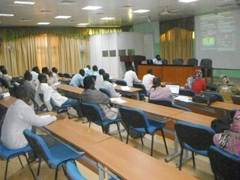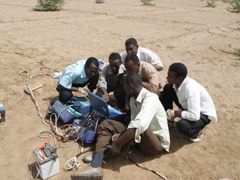- Home
- Technical Cooperation Projects
- Index of Countries
- Africa
- Sudan
- Capacity Development Project for Provision of the Services for Basic Human Needs in Kassala
- Project News
- Toward Effective and Sustainable Water Resource Development by State Water Corporation Engineers
Project News
2012-08-31
Toward Effective and Sustainable Water Resource Development by State Water Corporation Engineers
In the northern part of Kassala, no sufficient water resource has been secured and it causes a chronic lack of water. Especially in the dry season, the water situation becomes critical. People who live there have to rely on a water truck which comes from Kassala city, the place 80 km away. However, when Japanese Experts conducted the preliminary research in the area, they found the possibility of earning sufficient water resource if able to conduct a highly accurate geophysical survey.
For enabling the effective and sustainable water resource development in such area, Capacity Development Project for Provision of the Services for Basic Human Needs in Kassala (K-TOP) conducts the transfer of new technology in Sudan, 2D (two dimensional) electrophoretic survey, to the Kassala State Water Corporation (SWC) engineers who work for the water service in Kassala State.
The 2D electrophoretic survey is a survey method which estimates underground structure by applying an electric current through the ground. Compare to the previous electric survey which can earn only one dimension information, the 2D one can visualize underground information in a wide sphere and enable to implement a highly accurate survey.
 Example of the result of 2D Survey: The red area on the surface shows a potential place of water development.
Example of the result of 2D Survey: The red area on the surface shows a potential place of water development.
The previous method can indicate only one point information (white line in the above figure) so that it is difficult to understand the water distribution range.
Although the survey method shows the advantage, if the engineer cannot use it properly, the survey result will be in a low quality and cannot be a basic data for the water resource development. For this reason, K-TOP keeps a basic policy to do step-by-step and steady technological transfer from the most basic to the advance level.
 Training on the measurement preparation in the field (in the first project year).
Training on the measurement preparation in the field (in the first project year).
The person in the center is Mr. Mataz, an engineer of SWC, who can now conduct a lecture.
 Training on the analysis of the data collected by the geophysical survey by using PC (in the second project year).
Training on the analysis of the data collected by the geophysical survey by using PC (in the second project year).
Trainees are analyzing the survey data.
Now, SWC engineers who acquired the skills through K-TOP activities are visiting the northern part of Kassala mentioned above for the survey. Furthermore, they are conducting a lecture on the method of 2D electric survey for the engineers in the other states and their skills are steadily growing.
In the future, it can be expected to have an effective development of a new water resource considering the cooperation with engineers in the other states or the other projects.
 Lecture toward the other states' engineers.
Lecture toward the other states' engineers.
Mr. Mataz, an engineer of SWC, conducted a lecture in Public Water Corporation Training Center (PWCT) in Khartoum for 5 days.
 Engineers learning how to use the measuring instrument.
Engineers learning how to use the measuring instrument.
Now, SWC staff who acquired the skills through K-TOP activities started the survey in the northern part of Kassala.
(Reported by Mr. Kengo Ohashi, Japanese Expert on Rural Water Supply (Geophysical Survey))
- About JICA
- News & Features
- Countries & Regions
- Our Work
- Thematic Issues
- Types of Assistance
- Partnerships with Other Development Partners
- Climate Change / Environmental and Social Considerations
- Evaluations
- Compliance and Anti-corruption
- Science and Technology Cooperation on Global Issues
- Research
- JICA Development Studies Program / JICA Chair
- Support for the Acceptance of Foreign HRs / Multicultural and Inclusive Community
- Publications
- Investor Relations
